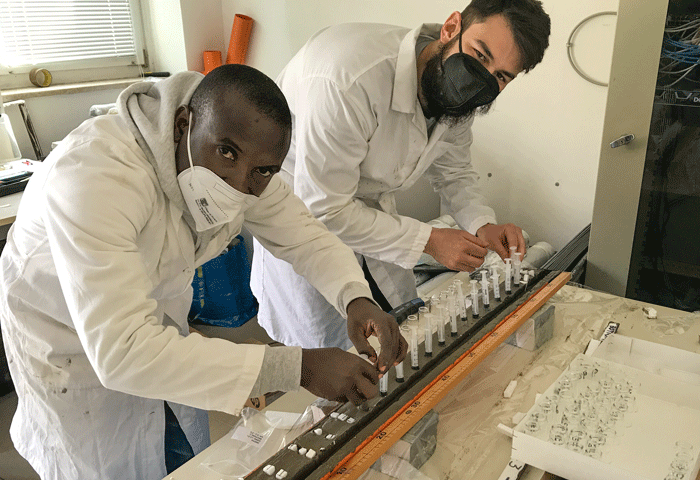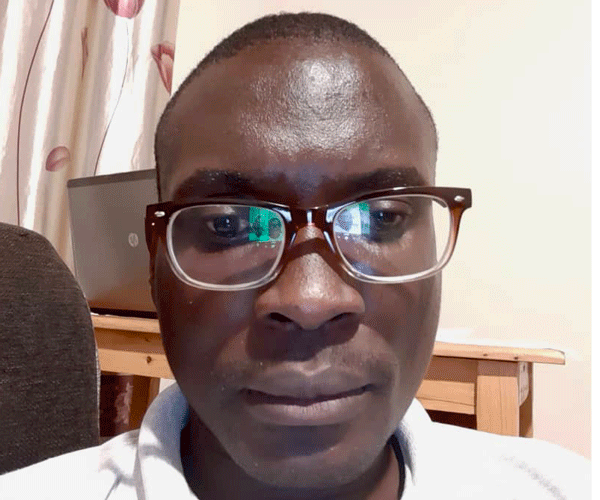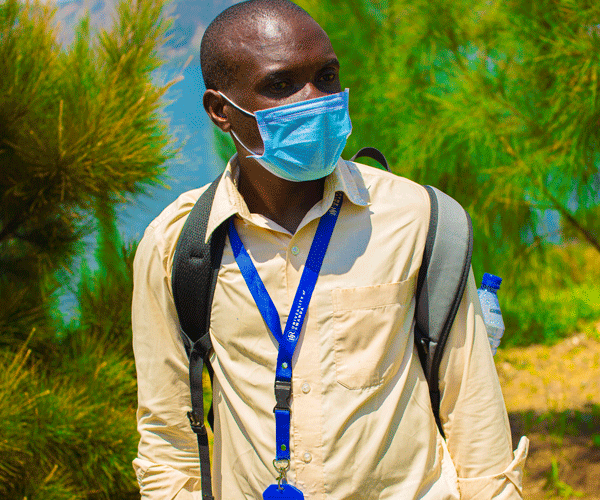
What was the climate like when, about 11,000 years ago in the early Holocene, mammoths and dodos—an extinct flightless bird of Mauritius—were playfully wandering on Earth? And why is this information important?
Studying the past climate is not an exercise in itself; quite the opposite. Hints about the prehistoric climate and climate fluctuations may help scientists to unveil and understand present trends, in which rising temperatures and ice-melting are calling for urgent measures worldwide due to what is commonly known as global warming.
Rwandan geologist Theophile Mugerwa, Head of the Geology Department and Lecturer at the University of Rwanda, in Kigali, agrees with this vision: "We are still in the Holocene epoch, but in comparison to 11,000 years ago, we are experiencing faster changes in climate, partially due to the impact of human beings on our planet. This is why, studying past changes, and the speed at which they occurred, may help predict climate trends in the medium run."
Mugerwa is among the 2021 winners of a TWAS-SISSA-Lincei Research Cooperation Visits Programme fellowship, bestowed under a South-North-South circular scheme launched by TWAS and its partners in 2020, to establish collaborations with the least developed countries.
He earned an MSc in geology, in 2015, from Annamalai University, in Chidambaram, India. Then, in 2020, he earned his PhD in petroleum geosciences at the University of Ibadan and Pan African University, both in Nigeria.
Through the TWAS-SISSA-Lincei Programme, he spent three months (from April to June 2022), in one of the partner laboratories, at the National Institute of Oceanography and Applied Geophysics (OGS) in Trieste, Italy.
"My early aspiration was to receive an education in public health, but the Rwandan Government started offering scholarships to earn a degree in geology. So, I opted for a different career," Mugerwa recalled. "Now I'm glad of this choice, because it is giving me the opportunity to have a position in Rwanda, and to travel and learn from colleagues from renowned institutes abroad."
The TWAS-SISSA-Lincei Programme was devised between 2017 and 2018, during preliminary meetings between TWAS and the Scuola Internazionale Superiore di Studi Avanzati (SISSA), with the aim of reinforcing joint actions in support of the least developed countries, in the frame of the United Nations Sustainable Development Goals (SDGs).
In 2019, the Accademia Nazionale dei Lincei joined the programme, after a meeting attended by Minister Giorgio Marrapodi, the then-Director-General for Development Cooperation at the Ministry of Foreign Affairs and International Cooperation.
Prominent contributions to the initiative came from the Centro Linceo Interdisciplinare “Beniamino Segre” of the Accademia Nazionale dei Lincei, and from the Italian Agency for Development Cooperation.
Under this programme, young scientists from the least developed countries with an MSc or higher degree can visit research laboratories at Centres of Excellence in Trieste, Italy. Each visit lasts about three months, and is instrumental to establishing new projects and collaborations in fields related to the SDGs.
During its first year, host laboratories were offered by SISSA and the International Centre for Genetic Engineering and Biotechnology.
Later, the programme was expanded and other institutes from the Scientific and Innovation System of Friuli Venezia Giulia joined, to include OGS, the Trieste Division of the Italian National Institute of Nuclear Physics, the Universities of Trieste and Udine, and the IOM Materials Foundry of the Italian National Research Council.
Mugerwa joined the laboratory of Michele Rebesco, Vice-Director of the OGS Geophysical Section, in April of this year. There, he worked in close contact with Rebesco and Renata Lucchi until June, studying the paleoclimate changes.
"True as it is that humans are massively impacting on Earth, speeding up all processes at the global level, we must also consider that many other factors influence how the climate changes," Mugerwa noted. "Climate fluctuates, and even in the past, due to its orbit, the Earth experienced climate changes, which influenced the climate dynamics."
Mugerwa's interdisciplinary project was titled "Integrated reconstruction of ice sheet dynamics during Late Quaternary Arctic climatic transitions (IRIDYA)", and was financed by the Italian Ministry of University and Research through the Arctic Research Programme.
"I spent most of my day working in the lab, analysing sediments coming from areas near Greenland," explained Mugerwa. "I had to do granulometric analysis, that is, find out the grain size distribution. I learned how to use a granulometer and employ carbon hydrogen and nitrogen analysis technique to identify the composition of the organic matter from sediments.
Mugerwa was also involved in the analysis of the data and their interpretation. "Theophile has enthusiastically welcomed the task we assigned him, learning quickly new methods that he will export to Rwanda, and processing a huge amount of data. We found a new, valid collaborator," Michele Rebesco said.
"Knowledge-transfer has driven his learning and our work," added Renata Lucchi, the national coordinator of the project. "This collaboration has set in motion important initiatives: Theophile wants to invite us to Rwanda to start new joint projects, and we welcome his participation in our studies."
Mugerwa's Italian experience brought new energy to his activities in Rwanda: with his name on international scientific publications stemming from the work carried out at OGS, he plans to find financial support to purchase a granulometer for his lab.
In addition, as he said: "We started studying heavy metals in wastewaters from mining activities, to reduce the pressure of human beings on the environment. I plan to develop a technique based on activated carbon, which is placed in water to remove its contaminants."
The technique is quite difficult to set, as it needs a lot of work and innovation. Therefore, the project is under development and the first field test is planned to start before the end of this year, possibly in November 2022.
*********
The TWAS-SISSA-Lincei Research Cooperation Visits Programme call is still open to young scientists from least developed countries who hold an MSc (or a higher degree), to visit research laboratories at Centres of Excellence in Trieste, Italy.
Deadline to apply is: 30 September 2022
Cristina Serra

